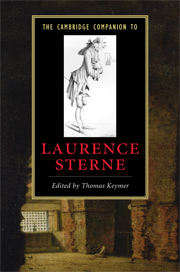Book contents
- Frontmatter
- Introduction
- 1 Laurence Sterne’s life, milieu, and literary career
- 2 Scriblerian satire, A Political Romance, the ‘Rabelaisian Fragment’, and the origins of Tristram Shandy
- 3 Tristram Shandy, learned wit, and Enlightenment knowledge
- 4 Tristram Shandy and eighteenth-century narrative
- 5 The Sermons of Mr. Yorick: the commonplace and the rhetoric of the heart
- 6 A Sentimental Journey and the failure of feeling
- 7 Sterne’s ‘politicks’, Ireland, and evil speaking
- 8 Words, sex, and gender in Sterne’s novels
- 9 Sterne and print culture
- 10 Sterne and visual culture
- 11 Sterne and the Modernist Moment
- 12 Postcolonial Sterne
- Further reading
- Index
- Series List
7 - Sterne’s ‘politicks’, Ireland, and evil speaking
Published online by Cambridge University Press: 28 January 2010
- Frontmatter
- Introduction
- 1 Laurence Sterne’s life, milieu, and literary career
- 2 Scriblerian satire, A Political Romance, the ‘Rabelaisian Fragment’, and the origins of Tristram Shandy
- 3 Tristram Shandy, learned wit, and Enlightenment knowledge
- 4 Tristram Shandy and eighteenth-century narrative
- 5 The Sermons of Mr. Yorick: the commonplace and the rhetoric of the heart
- 6 A Sentimental Journey and the failure of feeling
- 7 Sterne’s ‘politicks’, Ireland, and evil speaking
- 8 Words, sex, and gender in Sterne’s novels
- 9 Sterne and print culture
- 10 Sterne and visual culture
- 11 Sterne and the Modernist Moment
- 12 Postcolonial Sterne
- Further reading
- Index
- Series List
Summary
In a collection donated to Cambridge University Library by Henry Bradshaw, a nineteenth-century scholar-librarian with interests in eighteenth-century Ireland, there is a scrapbook he called his 'Sterne volume'. Sterne's most recent biographer, Ian Campbell Ross, notes the existence of this volume - a compilation of 132 texts of political and satirical material, most printed, some written by hand, dating from the 1720s and 1730s - as possible evidence of Sterne's continuing interest in Ireland. Its survival is intriguing to anyone interested in Shandean whodunits, since it holds out the seductive fantasy of working out what Sterne's identification with the country of his birth might have been. While his Irish provenance was unknown to many of his contemporaries, it was occasionally acknowledged. Accused of ridiculing Irish friends, Sterne had remonstrated: 'Besides, I am myself of their own country:- My father was a considerable time on duty with his regiment in Ireland; and my mother gave me to the world when she was there, on duty with him.' In what ways Sterne's imputed mockery of Irishness may have been already predicated on a condition of self-mockery is something to consider. A formative period of Sterne's life was spent in barracks in Ireland, intermittently 'home' in the peripatetic wandering of an army family posted to counter the Jacobite threat; this included a year in Westmeath with his wealthy 'kind-relation' Brigadier-General Robert Stearne, whose experiences at Namur found their way into Tristram Shandy. His mother's family hailed from Clonmel, in County Tipperary.
- Type
- Chapter
- Information
- The Cambridge Companion to Laurence Sterne , pp. 95 - 110Publisher: Cambridge University PressPrint publication year: 2009



